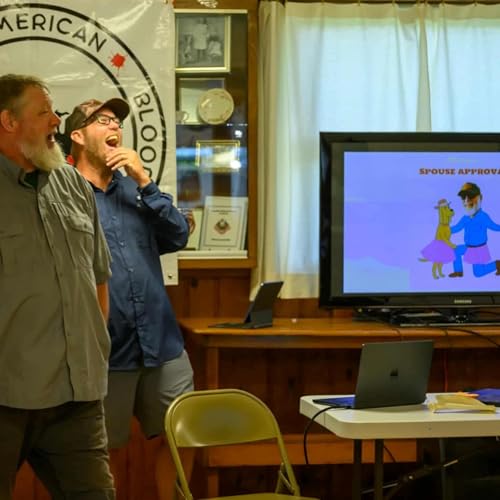Summary
This conversation explores the intricacies of deer hunting and tracking, emphasizing the importance of community, conservation, and education. Dale, a prominent figure in the Michigan deer hunting community, shares his experiences and insights from the ABTA event, highlighting the significance of collaboration among hunters and trackers. The discussion delves into the science of scent tracking, best practices for hunters, and the role of technology in deer recovery. Overall, the conversation underscores the shared goals of preserving wildlife and enhancing the hunting experience through knowledge and camaraderie. In this conversation, the speakers delve into the intricacies of scent tracking in dogs, the significance of training and patience in hunting, and the ethical considerations hunters must keep in mind. They discuss the elite tracking test, the importance of community and relationships in hunting, and the recruitment of new hunters. The conversation emphasizes the need for education and understanding in the hunting community, particularly regarding the use of tracking dogs and the recovery of deer.
Takeaways
Dale emphasizes the importance of community in deer hunting.
Conservation efforts are crucial for recovering deer after a shot.
The ABTA event provided valuable insights into tracking techniques.
Understanding scent is key to successful deer tracking.
Hunters should build relationships with trackers before the season starts.
Honesty from hunters helps trackers in recovery efforts.
Scent can linger and move in ways hunters may not realize.
Technology plays a significant role in modern tracking methods.
Training and certification for trackers enhance recovery success.
Camaraderie among trackers mirrors the spirit of deer camps. The number of scent receptors in dogs varies, but problem-solving ability is crucial.
Patience is essential both before and after taking a shot.
Hunters should not feel ashamed to call for help when tracking a deer.
Dogs trained for tracking can be of any breed, not just traditional ones.
The elite tracking test is a rigorous assessment of a dog's abilities.
Understanding scent theory can significantly improve tracking success.
Community and relationships among hunters enhance the overall experience.
New hunters need guidance and support to feel comfortable in the field.
Ethical hunting practices are vital for the sustainability of the sport.
Drones can assist in tracking but come with legal and ethical considerations.
Keywords
deer hunting, tracking, conservation, ABTA event, community, scent tracking, hunting techniques, deer recovery, hunting tips, dog training, scent tracking, dog training, hunting ethics, deer recovery, tracking tests, patience in hunting, community in hunting, recruitment of hunters, tracking dogs, hunting tips, Jim Shockey, Ted Nugent
 2 hrs and 12 mins
2 hrs and 12 mins 2 hrs and 29 mins
2 hrs and 29 mins Aug 18 20251 hr and 45 mins
Aug 18 20251 hr and 45 mins Aug 18 20252 hrs and 25 mins
Aug 18 20252 hrs and 25 mins Aug 18 20251 hr and 29 mins
Aug 18 20251 hr and 29 mins 2 hrs and 11 mins
2 hrs and 11 mins 1 hr and 28 mins
1 hr and 28 mins Jul 12 20251 hr and 47 mins
Jul 12 20251 hr and 47 mins
